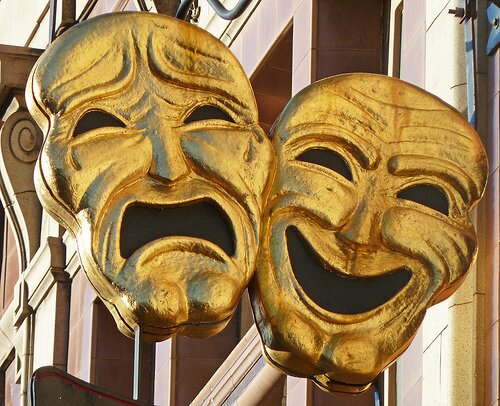I’m delighted to share my thoughts about conservative theatre with Liberty Island.
As the founder and president of Stage Right Theatrics—the country’s only conservative theatre company—you’d think I’d have a pretty firm grip on just what “conservative theatre” means. Well, I’ve got a grip on it, but I often feel as though I’m holding onto something that’s been thoroughly greased. That’s because the concept of a “conservative theatre” is, in my mind, still evolving. Its definition has expanded over time as I have given it more thought and read/produced more plays, but it is still very much a work in progress. Here’s where I’m at with it now.
It may be easier to define “conservative theatre” by what it’s not: it is not corporate musicals, money-making revivals, or blockbuster theatrical extravaganzas—often defined as “conservative” because they seek to turn a profit. It also does not exist simply to parody or satirize the views of the left (which would be extremely easy to do). It is not jingoistic flag-waving to John Phillip Sousa music. And it most definitely is not, as Lisa Goldman, the artistic director of the Soho Theatre (London) described it: “Anti-democracy, misogyny, bigotry, [and] nostalgia of all kinds.” Okay, that’s what it’s not. So, what is it?
First off, conservative theatre recognizes that the conservative in society has every right to be disturbed by events in society and to speak out against them via the arts—just as the progressives do. Conservative theatre acknowledges the existence of human nature, a divine presence, and institutions that protect and support liberty. A conservative play celebrates individualism and positions the individual not by his or her demographics or identity group, but by the extent to which the individual takes accountability for his or her actions and relies on him/herself more than he/she does the government or group think. Conservative theatre places great value on vows (marriage or otherwise) and traditional characterizations of the sexes. It does not, for example, subscribe to the notion that a man can be a woman just because he/she “feels” that way. Finally, conservative theatre calls upon the past to inform the future—there are no statues coming down in conservative plays!
But there’s another aspect of conservative theatre that’s become part of my definition. If “conservative” is akin to “traditional,” then not only the subject matter but the writing style should be “conservative.” From the plays I have reviewed for my theatre company, and those I’ve seen produced at competitive festivals, contemporary playwrights seem to have learned nothing from the masters of the past (the Greeks, Shakespeare, O’Neill, Miller, Williams, Lanford Wilson, Stoppard, Chekhov, Ibsen—although in translation he can seem quite melodramatic and heavy-handed). Instead, their muses seem to be Saturday Night Live and an endless supply of sit-coms and “dramatic” television shows that are superficial, trite, and reliant on sex to stimulate (pardon the pun) conversation. Contemporary plays have become extended sketches where borderline sane, sexually starved, self-centered young characters engage in unimportant discussions over uncompelling situations. Plays that should shake us to our marrow instead let us off lightly, demanding that we feel sorry for whatever pathetic character is facing because he or she is, of course, marginalized because of his/her group identity. And in order to qualify as “deep,” these plays present to us the most joyless, nihilistic, death-embracing situations with little chance of redemption. Their message is clear: the best you can hope for is to slog through life with the cares and burdens of your existence unimproved until death do you part. Between the superficial comedies and the egocentric serious plays, we have nothing that shows us how to live free or how to succeed.
What I am calling for with conservative theatre, then, is a theatre that both hearkens back to the days of good, meaningful writing and celebrates the individual without bitterness, without fear, without anger, without group think, and certainly without the need to call upon a government to do anything more than give us the conditions by which we may be free.
*****
Photo by Tim Green aka atoach 



Comments
Leave a Reply